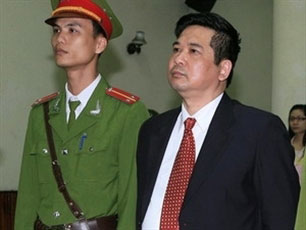My high hopes for Vietnam’s progress toward a prosperous open society weren’t shaken by the harsh sentence — 7 years in prison plus 3 years of house arrest — handed down against prominent Vietnamese dissident lawyer Cu Huy Ha Vu. It only serves to remind me again that Vietnam’s development model is China, not the Philippines.
I’m not disrespecting the huge progress made by the Philippines since its 1995 WTO accession. It isn’t an easy task to knit together an archipelago of 7,100 islands speaking 175 different languages into a cohesive economy that complies with national goals and global standards. The pain and struggles of the first 14 years, compounded by the crash of 2008, are being rewarded with a 7.3% growth rate for 2010, the highest since 1976. That figure is likely to be repeated or even exceeded in 2011. The benefits of massive reform always take longer to materialize than everyone hopes, but once the momentum gets going, it accelerates.
And so it is with Vietnam, though it has followed a different model. Rather than starting with democracy and proceeding toward economic liberalization — as the Philippines did — Vietnam’s communist regime followed the Chinese model in beginning its reforms by liberalizing the economy while preserving a one-party system designed to maintain social stability.
Of course the economic reforms were essentially forced on it in the early 1990s by the dissolution of Comecon — the system of trade among Soviet-bloc nations — in the wake of the Soviet collapse. Regardless of the reason, Vietnam’s leaders made a big push to open itself to trade and investments from the U.S. and other western and Asian nations. Today its main trading partners are its old arch-enemies — the U.S. and China.
Its top export destinations are the U.S. (21.2%), Japan (12.3%), Australia (9.4%), China (5.7%) and Germany (4.5%). Its top import sources are China (17.6%), Singapore (12.9%), Taiwan (11.5%), Japan (9.8%), South Korea (8.4%), Thailand (7.3%), Malaysia (4.2%).
It was because Vietnam was importing so much from China while exporting virtually nothing to it that in 2009 Prime Minister Nguyen Tan Dung struck a deal with China to give state-controlled Chinalco the right to develop bauxite mines in the lush Central Highlands, bauxite being the raw ore from which aluminum is processed. Dung also began talking with Alcoa of the U.S. Vietnam has the world’s third largest bauxite reserves, and its development and export will generate billions each year to help offset some of the deficit produced by importing so much Chinese consumer goods and machinery.
These moves stirred up a protests by old-line xenophobes and new-age environmentalists, as well as activists like Cu Huy Ha Vu, a Sorbonne-educated lawyer who operates a law firm in Hanoi with his wife, also a lawyer. In addition to being a vocal critic of the one-party system, Vu had once made an unsuccessful bid for a parliamentary seat. In 2009 Vu sued Dung for approving the China deal. He sued Dung again in 2010 for signing a decree prohibiting class-action lawsuits. He has become the most visible among Vietnamese activists calling for a multi-party system. One reason for all the press Vu attracts is his background: he is the son of a famous poet who was a constant companion to Ho Chi Minh.
Vu’s arrest in November of 2010 for violating Article 88 of the Vietnamese criminal code — banning propaganda against the state — was seen as inevitable, even by Vu himself. But like maybe two dozen others, Vu wanted to put himself and his stance irrevocably on the record.
Despite this predictable act of suppression of dissent justified by an oppressive reading of a loosely-drafted law, I remain optimistic that Vietnam is moving toward a more open society. One obvious reason, of course, is its commitment to integrating itself into the global economic system by joining the WTO in 2007. It’s virtually impossible to join the WTO, with all its requirements of transparency and openness to foreign competition, while isolating one’s people. Already Vietnam has an estimated 16 million people online, thousands of whom have been freely criticizing the government, far more freely and openly than in China. Few, however, pose the threat of being able to generate the kind of serious attention as Vu, with his communist-party pedigree.
Another reason for my optimism about Vietnam’s future is the shift I see in its leadership structure. In the old days the top leadership was made up entirely of aging northerners who had led the fight against France and the U.S. and, understandably, were xeonophobes. Today the top two leaders are both relatively youthful southerners. Despite his post as prime minister Dung was outmaneuvered for the nation’s number one post by another southerner named Truong Tan Sang. As Senior Politburo Member Sang is deemed number one in the leadership pecking order. Significantly, for the first time in Vietnam’s history, the man who holds the post of General Secretary in the Communist Party isn’t at the top of the leadership structure but way down in eighth position. This subtle but symbolic change suggests a relatively open path toward more aggressive future reforms free from party dogma.

